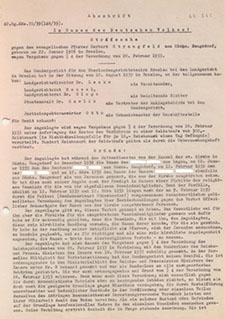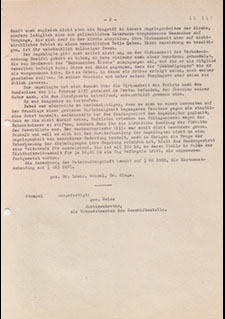Public Announcement of Membership Withdrawals
The number of withdrawals from the Protestant church started rising sharply in 1936. On February 18, 1937, Reich Minister of the Interior Wilhelm Frick forbade with a circular directive any public announcement of the names of individuals who had left the church. In particular, he prohibited reading the names aloud from the pulpit. The “Decree of the Reich President for the Protection of the People and State” of February 28, 1933 served as the legal basis. Prison sentences or fines were threatened in the event of noncompliance.
The directive was aimed at the church practice of announcing membership withdrawals by naming names from the pulpit at church services, which was common in many places. With its directive, the Nazi state wanted to prevent individuals willing to leave the church from being stopped because their names would be announced.
The Council of Brethren of the Evangelical Church of the Old Prussian Union instructed parishes in a resolution of June 3, 1937 to continue to announce membership withdrawals at church services. Congregational members had a right to learn who had left the Christian fold. Moreover, the congregation had the duty to pray for those who had left.
Numerous Council of Brethren members were arrested by the Gestapo as a result. The Council of Brethren adhered to its position however and stated in a resolution of June 27, 1937: No secular authority can release the congregations from this duty of intercessory prayer; congregations are also not able to be forbidden to perform this duty by secular authority.
The Gestapo used harsh actions to pursue violations of the state ban on announcing membership withdrawals. Numerous pastors were expelled from their offices and residences, arrested and brought before the court.
One of them was a pastor in Silesia, who still read the names of withdrawing members aloud two years after the ban and was sentenced to a fine for this by the Breslau special court. In the spirit of the instructions from the Old Prussian Council of Brethren, he gave as his reason that prayer for the members who had left the congregation was essential to him … and he therefore felt it necessary that the congregation, which performs this purely church rite with him, knew the names of those for whom it was done.
Source / title
- ©Evangelisches Zentralarchiv in Berlin, 50/46, Bl. 141f.


